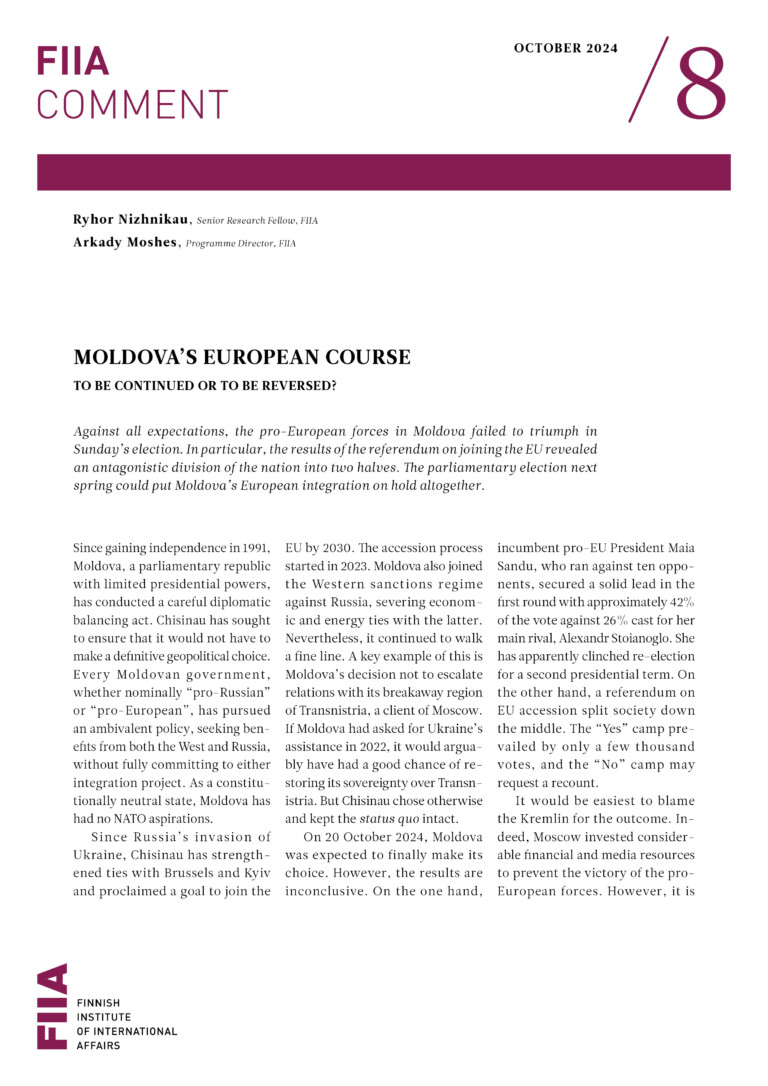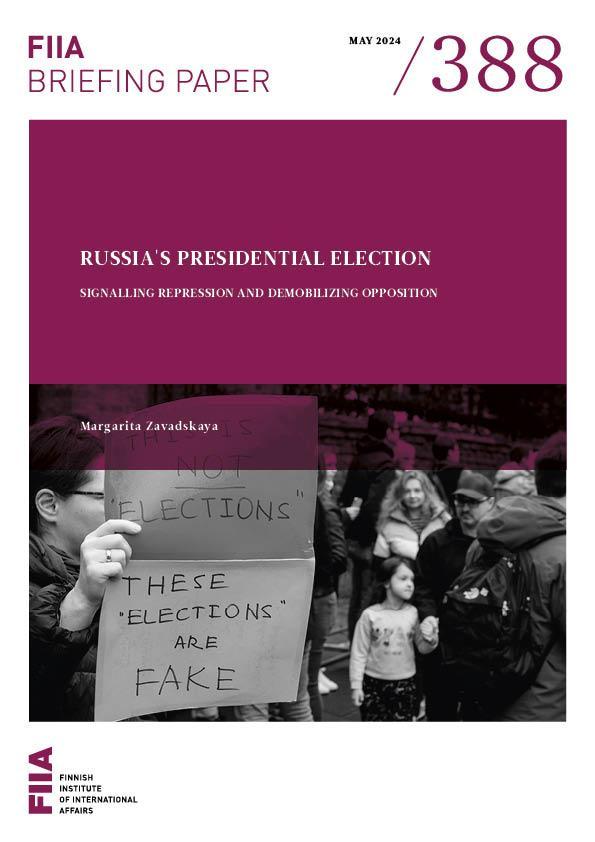
Against all expectations, the pro-European forces in Moldova failed to triumph in Sunday’s election. In particular, the results of the referendum on joining the EU revealed an antagonistic division of the nation into two halves. The parliamentary election next spring could put Moldova’s European integration on hold altogether.
Since gaining independence in 1991, Moldova, a parliamentary republic with limited presidential powers, has conducted a careful diplomatic balancing act. Chisinau has sought to ensure that it would not have to make a definitive geopolitical choice. Every Moldovan government, whether nominally “pro-Russian” or “pro-European”, has pursued an ambivalent policy, seeking benefits from both the West and Russia, without fully committing to either integration project. As a constitutionally neutral state, Moldova has had no NATO aspirations.
Since Russia’s invasion of Ukraine, Chisinau has strengthened ties with Brussels and Kyiv and proclaimed a goal to join the EU by 2030. The accession process started in 2023. Moldova also joined the Western sanctions regime against Russia, severing economic and energy ties with the latter. Nevertheless, it continued to walk a fine line. A key example of this is Moldova’s decision not to escalate relations with its breakaway region of Transnistria, a client of Moscow. If Moldova had asked for Ukraine’s assistance in 2022, it would arguably have had a good chance of restoring its sovereignty over Transnistria. But Chisinau chose otherwise and kept the status quo intact.
On 20 October 2024, Moldova was expected to finally make its choice. However, the results are inconclusive. On the one hand, incumbent pro-EU President Maia Sandu, who ran against ten opponents, secured a solid lead in the first round with approximately 42% of the vote against 26% cast for her main rival, Alexandr Stoianoglo. She has apparently clinched re-election for a second presidential term. On the other hand, a referendum on EU accession split society down the middle. The “Yes” camp prevailed by only a few thousand votes, and the “No” camp may request a recount.
It would be easiest to blame the Kremlin for the outcome. Indeed, Moscow invested considerable financial and media resources to prevent the victory of the pro-European forces. However, it is obvious that Russia can still interfere in Moldova’s elections largely because of the country’s deep-rooted structural problems.
Among these, the economy is a major concern. Polls indicate that it worries far more people than the war in the neighbouring country. This is hardly surprising given that Moldova is Europe’s poorest economy. Maia Sandu’s campaign emphasis on maintaining peace for Moldova only underlines the government’s lack of economic achievements to showcase.
The record on fighting corruption and strengthening the rule of law is mixed. While various sources, including the European Commission, highlight certain improvements, they are far from sufficient. Attempts to prevent selective application of the law and to clean up the judiciary are undermined by delays in advancing to the follow-up stages of judicial reform. This puts the sustainability of the progress achieved in jeopardy.
Furthermore, Sandu herself and her party, the Party of Action and Solidarity (PAS), which won the previous parliamentary election in 2021 on a pledge of zero tolerance for corruption, have faced multiple accusations of resorting to old governance methods, ignoring civil society and relying on dubious individuals.
Crucially, Chisinau has no clear strategy for dealing with Transnistria and, to a lesser extent, the autonomous region of Gagauzia. Preserving the old modus vivendi deepens Moldova’s exposure to Moscow. Even if the current arrangement stabilizes the security situation, Transnistria remains a roadblock to Moldova’s prospective EU membership. Unlike Cyprus, which was admitted into the EU despite being a de facto divided territory, Moldova cannot expect to join the Union while bringing along an unreformed region that also hosts a Russian military presence.
With parliamentary elections looming next spring, this situation is extremely concerning.
It must also be admitted that what has happened is just as much of a defeat for Brussels, which invested heavily in Sandu. Brussels explicitly endorsed her political strategy, which prioritized security over fundamental reforms. Since the last parliamentary election, the EU has provided Moldova with more than €2.2 billion in loans and grants. Shortly before election day, the EU pledged another €1.8 billion support package for 2025–2027. This step appeared to be a politically motivated gift to the government.
The EU rightly sees Moldova as a key element of its revised Eastern neighbourhood policy. A pro-Western Moldova is also important for Ukraine’s success in the war. For these reasons, the West should redouble its efforts to keep Moldova on a European trajectory. However, the EU must avoid repeating past mistakes. Moldova – together with Georgia, for that matter – was once the EU’s poster child, but later lost all credibility and began to be perceived as a dysfunctional country and a prime example of state capture. Even if the pro-Russian forces do not prevail next spring, a lesson needs to be learned: the only way to reduce Moscow’s destructive influence in the country is through comprehensive institutional reforms, which should not be abandoned in favour of short-term political gains.










